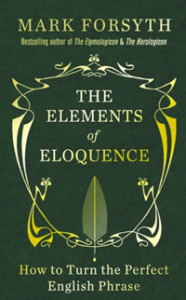The Elements of Eloquence
How to Turn the Perfect English Phrase
by Mark Forsyth. Published by Icon Books www.iconbooks.net
“Shakespeare was not a genius” is a bold and attention-grabbing opening line (so much so I’m stealing it here). Mark Forsyth would have us believe he was merely a jobbing writer who learned the tricks of his trade and got better with practice. With ‘The Elements of Eloquence’ he wants to show us those recipes for forging a great line. The same sort of tricks that Shakespeare would have learned at school and certainly put into practiced in his writing have long since disappeared from any modern curriculum. But even if you never write a word, ‘Elements…” aims to give you an under-the-hood look at the working of the language at its best and show you just why a particular quote or poem or lyric is so powerful and memorable.
This is a book that champions style over substance – not what is said but how it’s said. Everybody remembers “Friends, Romans, Countrymen” but who remembers “Romans, countrymen and lovers!” (Brutus’ speech)? And as Forsyth points out, saying “Full fathom five thy father lies” makes you a great poet while “Your father’s body is 29 feet down” just makes you a coast guard delivering bad news.
I should mention here that Forsyth has something of a cavalier attitude to definitions. Serious English scholars may disagree with the exact meanings given for some of the elements in the book. If you are one of those, Forsyth makes it quite clear that he will be happy never to hear from you. Really. Quite clear. It involves brambles and sticking your objection… Well, let’s just say; quite clear.
Each ‘element’ gets a little chapter of it’s own. You’re doubtless familiar with ‘alliteration’ – a style beloved of newspaper headline writers. You probably already know ‘hyperbole’ and ‘rhetorical questions’. You might even be willing to have a bash at ‘assonance’. However, by the time you reach ‘Polypoton’, ‘diacope’ or ‘epizeuxis’ you would doubtless, like me, be thoroughly lost were it not for Forsyth’s little guide.
Most of the chapters start out with a few samples of the element illustrated quite cleverly in the opening paragraph before heading into the source of the style (the Romans have a lot to answer for) and its use in everything from classic poetry to pop songs. How you place your nouns and verbs, the rhythm of words, all the tricks and rhythms used to make the dull phrase sing are examined. And the book itself sings. Though the subject matter conjures up grey memories of ghastly dull school lectures and the book cover is not prepossessing, Forsyth – unsurprisingly – really knows how to turn a phrase. ‘Elements of Eloquence’ is definitely in the ‘laughing-out-loud-in-the-bookstore’ category.
Aside from being entertaining in its own right and a must-have for lovers of language, this book will do two things for you. One: it will help inoculate you against the sway of empty rhetoric and two: if you do have something worthwhile to say, it will help you say it well.
